
views
Planning

Choose a theme for the bake off. To make it easier to settle on recipes, it helps to have a theme for the bake off. You might choose a specific type of baked goods, such as cookies, cakes, pies, or brownies, or a specific event to bake for, such as desserts for a holiday, birthday, or wedding. A specific ingredients, such as apples or pumpkin, can also be a good theme. A seasonal theme can work well too. For example, ask for summer desserts or fall-inspired treats. A movie or book can be a fun theme as well. For example, request Harry Potter-inspired baked goods. You can even use a color for the bake off's theme. For example, ask for baked goods that feature red ingredients.
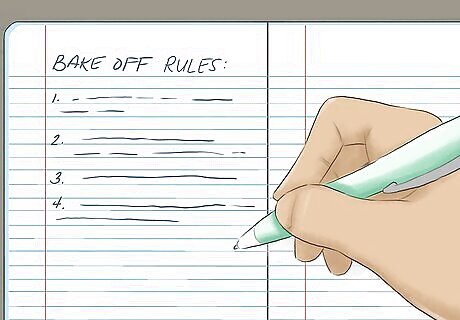
Decide on the rules for the bake off. A bake off can be arranged in several different ways. You can give the participants the general theme and let them choose their own recipes or you might choose a single recipe and have all of the participants make the same thing. It’s also important to decide if participants will bake their entry at the venue or bring a finished product to the event. Having participants bake on site is very exciting, but it can be more difficult to find a venue with the proper kitchen facilities so having bakers bring finished entries may be more convenient. Write down a set of formal rules for the bake off once you settle on them. Participants will want to know all of the guidelines before they agree to take part. You should also decide if you will charge an entry fee. If you’re holding the event to raise money, having participants pay a small fee makes sense. Anywhere from $5 to $20 may be appropriate, depending on the event.

Settle on prizes for the bake off. To give people incentive to participate, it helps to have some type of prize for the winner(s) of the bake off. If the event is sponsored by a local business, it might be a cash prize. You can also hand out a trophy, ribbon, or certificate. The bake-off prize can be worth any amount, but typically, $25 to $100 is a good range. You may decide that only the first-place winner receives a prize, but you can also have smaller prizes for the second and third-place winners if you like. If you’re holding the bake off for fun, you just might purchase small items to use as prizes, such as an apron or pot holders. A bake off can also function as a fundraiser. Even if you give the winner a small prize, you can then sell off all of the baked goods afterward to raise money for your cause.

Set a date and time for the bake off. Once you’ve settled on the basic guidelines for the bake off, you’ll need to find a day and time to hold it. It may depend on when you can secure a venue, but it’s usually best to hold it on a weekend when people typically have more free time. If you're using a holiday or other special occasion as a theme for the bake off, you'll want to time the event to appropriately. In most cases, you'll want to hold the contest within a two to three weeks of the holiday. For example, if the bake off has Christmas theme, you'll want to hold it within the first two to three weeks of December.
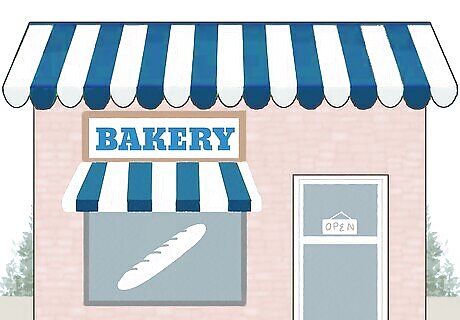
Find a venue for the bake off. When you’ve settled on a date and time for the bake off, you’ll need a location for it. If you plan to have participants bake their entries at the event, you’ll need a spot with multiple ovens and stove tops. If you’re having participants bring prepared baked goods to the event, you only need a spot where there’s room for a judging table and space for an audience. If you need a venue with cooking equipment, you might look online for catering facilities that could support the bake off. A bakery or restaurant can be an ideal venue too. Talk to local businesses to see if they're interested in partnering with you for the bake off. If you only need a space to showcase the finished baked goods, any catering hall or party room that's available for rent will work.
Hiring Personnel

Select at least one judge for the bake off. To determine the winner of the bake off, you’ll need at least one judge to taste and evaluate the baked goods. Ideally, the judge(s) should have some baking knowledge and experience, but that doesn’t necessarily have to be as a professional. The judges shouldn't have any personal connections to the contests to avoid any claims of bias. In general, the more participants your bake off has, the more judges you’ll want. A panel of three judges works well for most bake offs, though. If your bake off has five or less participants, though, a single judge is usually sufficient. For five to ten candidates, two judges work well. People who would make good candidates for judges include local bakery and restaurant owners, culinary teachers from local schools, or bakers who've won other bake offs. When you're talking to potential judges, you might say something like, "We're holding a bake off and would really like your expertise in judging the entries." If you're holding the event to raise money for a cause, provide information about the organization or group that will benefit to the potential judges.

Find participants for the bake off. A bake off can’t happen if there aren’t bakers to participate. Ask friends, family, co-workers, and/or classmates who you know enjoy baking to take part. You can also create flyers with all of the details to post in your neighborhood, on your school or office bulletin board, or other locations to invite people to participate. Make sure to get permission before you post any flyers on private property, such as a store window. If you’re active on social media, you can also post online about the bake off to find participants. For example, making a Facebook event for the bake off is a good way to generate buzz. You can also use Twitter and Instagram to do a countdown to the event as a way to keep people interested.
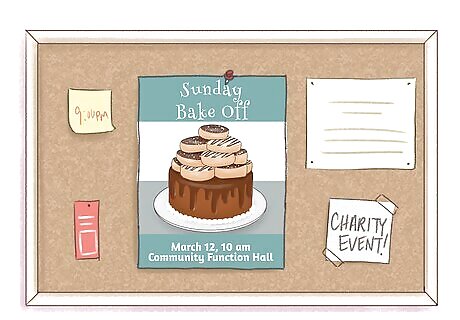
Invite people to watch the bake off. It’s not necessary, but it can be fun to have an audience to attend the bake off. Once you’ve secured participants, create a flyer that advertises the event for anyone who might like to watch and post them in your neighborhood and/or school or office bulletin board. If you’re holding the bake off as a fundraiser, you can sell tickets to the event. You can charge however much you like for the tickets, but it's best to keep the price between $5 and $10.
Arranging Supplies

Create judging sheets. To make it easier for the judges to evaluate the entries, you should create scoring sheets for them to use. Decide what categories they should judge, such as taste and appearance, and what scale they should use, such as 1 to 5 or 1 to 10. Make enough copies so each judge has one for every contestant. Some judging categories to consider include overall taste, texture, presentation, originality, adherence to theme, and skill level. There should be a spot on the judging sheets for the judge to write their own name, as well as the contestant’s name.

Make copies of the recipe if it's that type of challenge. If all of the participants are preparing the same recipe for the bake off, you’ll need to make enough copies so all of the participants have one. Don’t hand them out until the bake off actually begins, though. You may also want to make copies of the recipe for the judges to consult.
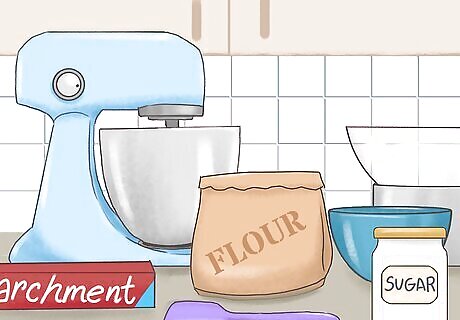
Gather baking supplies if necessary. If participants are baking their entries at the bake off, you’ll need to have supplies on hand for them to use. You’ll need ingredients, such as flour, sugar, eggs, butter, and vanilla, as well as bakeware, such as mixing bowls, electric mixers, cookie sheets, and cake pans. If participants are using their own recipes, you should ask them if there are any special ingredients or equipment that they’ll need so you can be sure to have them on hand for the event.
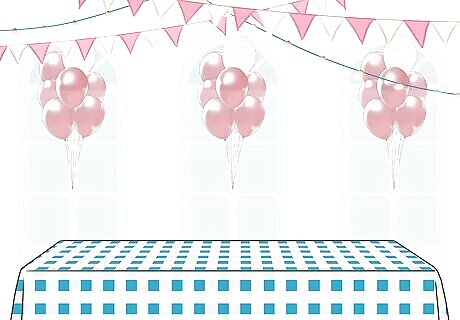
Gather decorations for the venue. To make the event feel more festive, it helps to decorate the venue. You don’t have to go crazy, but some colorful disposable tablecloths, decorative bunting, and simple balloons can help dress up the space. It's a good idea to match your decorations to the theme of the bake off. For example, orange, red, brown, and gold decorations work well for a fall-themed bake off.
Supervising

Verify that the venue is set up properly. The day of the bake off, take a walk around the event space. Check that any necessary ingredients and equipment are on hand and there are tables for the contestants to display their entries. Make sure that you have all the necessary recipes and/or scoring sheets as well.
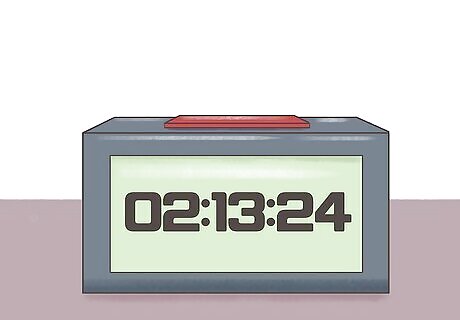
Time the entries. If participants are baking their entries at the venue, you’ll need to give them a set amount of time to prepare their baked goods. Use a countdown clock that is visible to everyone at the venue, and don’t allow anyone to submit an entry that isn’t ready after it ticks down. If guests are preparing their entries at home, you should still have a set time when the entries have to be on the judging table.
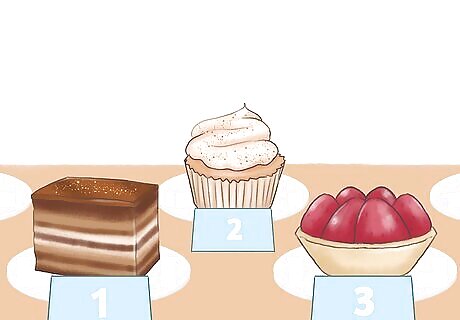
Have the participants place their entries on the table with no names. All of the participants should put their entries on tables in a designated judging area. However, the participants’ names shouldn’t be placed with their entries to ensure that the judges are objective. Just number the entries and keep a list of which entry belongs to which participant.
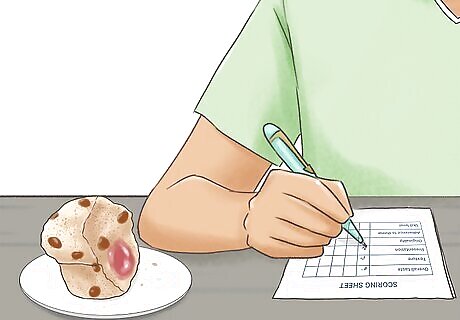
Give the judges time to fill out the voting cards. Once the entries have reached the judging table, allow the judges to look at and taste each one. After they’ve tasted the entries, they should be given some time to fill out their scoring sheets so they can be as thorough as possible. The amount of time that the judges will need depends largely on how many entries there are. The more baked goods they have to judge, the more time they’ll likely need. In general, you'll want to give the judges at least five minutes to evaluate each entry.
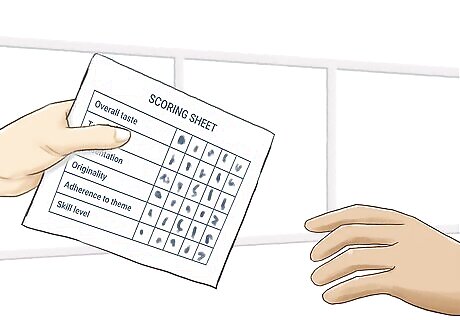
Collect the scoring sheets and tally the votes. After the judges have had some time to evaluate the entries, gather up their judging sheets. Add up the scores for each participant so you can determine who the first, second, and third-place winners are.

Announce the winner(s). Once you’ve counted all the votes, it’s time to announce the winner. If you’re naming the top three vote getters, start with the third and second-place winners and save the first-place winner for last. Hand out the prize(s), and take some photos of the winners to remember the day.




















Comments
0 comment